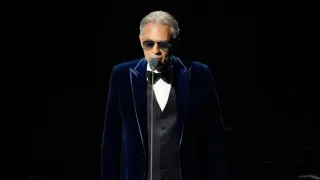September 19, 2023
BLO's Rethought 'Madama Butterfly' Neutralizes Opera's Drama
Ed Tapper READ TIME: 4 MIN.
The Emerson Colonial Theatre was the venue for Boston Lyric Opera's new season-opener, Puccini's "Madama Butterfly." The composer's personal favorite work from his impressive operatic canon, "Madama Butterfly" has been wrenching the hearts of audiences for well over a century. Based on an 1898 short story, later adapted to a play by David Belasco, "...Butterfly" has been filmed as a Hollywood movie, as well as an opera. Several live performances have been made available on every home video format, and the tragic tale was also the inspiration for the 1989 musical, "Miss Saigon." The story of an innocent Japanese girl wed to, and ultimately abandoned by, Pinkerton, an American sailor, is hardly a mere tear-jerker, as the score contains some of Puccini's most exquisite and inspired music.
Considering the dearth of staged opera in Boston, it would be wonderful to occasionally experience an attractive, traditional, well-sung production of an operatic staple. However, it seems that, these days, to quote another great writer of the musical stage, Sondheim, "You gotta get a gimmick;" and poor Puccini seems to be the fall guy. Last year, BLO presented "La Boheme" backwards. Under the directorship of Phil Chan, the company has taken a socio-political slant on its "Madama Butterfly," setting the opera in San Francisco at the outbreak of WWII. The heroine, Cio-Cio San, is not an adolescent Japanese waif, but an experienced Chinatown nightclub singer posing as Chinese to hide her Japanese heritage Ultimately, she is sent to an incarceration camp for Japanese Americans, where the son she has borne to Pinkerton has contracted tuberculosis. In BLO's production, the opera closes with the little child dying, instead of Butterfly's suicide.
According to the company, this refashioning of Puccini's opera was meant to underscore a sad chapter in our history for Japanese Americans, as well as anti-Asian hate crimes following the recent pandemic. Unfortunate as these occurrences were, the question is whether or not an opera is the appropriate forum, especially at the expense of the composer's original intentions; and whether or not the concept succeeds in supporting and advancing the drama. Sadly, BLOs interpretation, and particularly the characterization of Cio-Cio San, neutralized much of the dramatic impact of the Puccini masterwork. Adding excerpts from vintage radio speeches, and dance sequences did nothing to further the drama, making for a muddled and prolix performance. This could have been excused somewhat had the singing been stellar.
The production crew and singers were mostly of Asian heritage. The key role of Butterfly was sung by Karen Chia-Ling Ho. Her voice is ample and has a rich timbre. However, she did nothing to modulate it in first act, which was sung in a dynamic range from mezzo-forte to forte. The voice has no real pianissimo, which would have been most effective in this music. In the second and third acts, she did manage to vary her dynamics more, and the famous aria, "Un bel di" was very nicely realized.
Dominick Chenes was a serviceable Pinkerton. He has a nice ring in his high register, but, like Ho, his acting was unconvincing. The best voice was that of the Suzuki, Alice Chung, who received the most enthusiastic and well-deserved ovation of the evening. The minor roles were handled capably. Set designer Yu Shibagaki deserves special praise for fitting the two imaginative sets into the limited confines of the Emerson Colonial Theater stage. As always, David Angus and his orchestra performed the score with their usual high level of proficiency.
You may be intrigued by this controversial rending of an operatic classic. If so, there are two more performances, on Friday evening, September 22, and a Sunday matinee on the 24th. If you might prefer something in a lighter vein, the BLO is offering up Rossini's delightful "La Cenerentola" in early November.
For further information on the 2023-24 season, or ticket info, visit the Boston Lyric Opera website.






